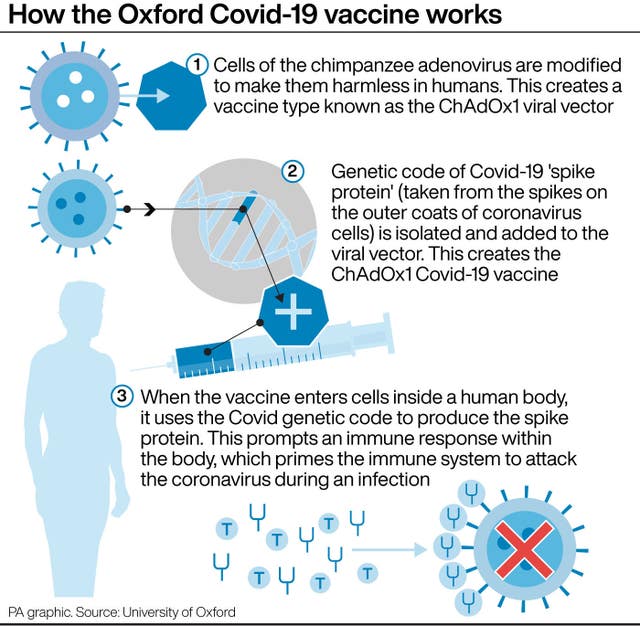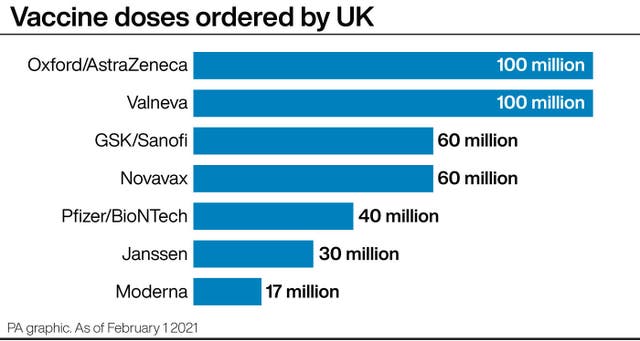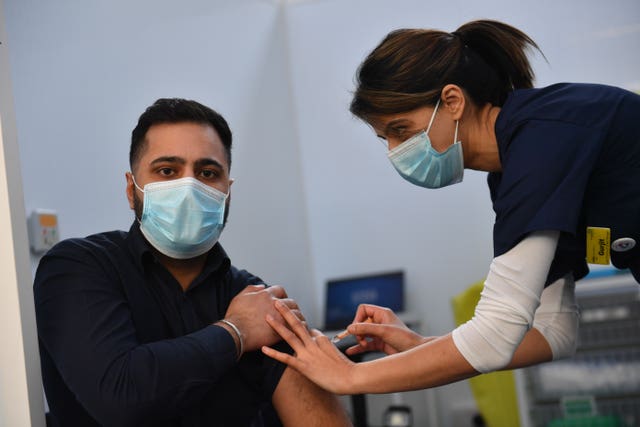Could the Oxford/AstraZeneca vaccine change the course of the Covid-19 pandemic?
Research has shown that the jab may reduce transmission by 67%.

The University of Oxford has released new data on its coronavirus vaccine which suggests the jab may reduce transmission by 67%.
The research, which has not yet been peer-reviewed, has also shown that the jab, developed with drugs firm AstraZeneca, offers protection of 76% up to 12 weeks after a single dose.
The findings were hailed by Health Secretary Matt Hancock as “absolutely superb”, and “will help us all to get out of this pandemic”.
But could this jab potentially change the course of and shape the future of the Covid-19 pandemic?
Here is all you need to know:
– What do the findings mean?
With most coronavirus vaccines, clinical data has shown them to be highly effective in stopping the recipients from getting severe Covid-19 disease.
However, it has not been clear whether they are also able to prevent asymptomatic infection and transmission.
The new study from the University of Oxford has shown, for the first time, that a Covid-19 vaccine can help reduce transmission.
This means the Oxford/AstraZeneca jab could have a greater impact on the pandemic, as each person who is vaccinated will indirectly protect other people as well.
– What else is exciting?

The research, based on 17,000 people in the UK, South Africa and Brazil, also showed that protection after taking the Oxford/AstraZeneca vaccine remained at 76% up to three months after the first dose.
This rose to 82% after people were given the second dose after 12 weeks.
The UK is prioritising giving the first dose to as many people as possible, with the aim of saving more lives by giving more people some level of protection.
Professor Andrew Pollard, chief investigator of the Oxford Vaccine Trial and co-author of the study, said the finding “supports the policy recommendation made by the Joint Committee on Vaccination and Immunisation (JCVI) for a 12-week prime-boost interval”.
– Will other vaccines do the same?

Vaccines from Pfizer/BioNtech and Moderna, which have also been approved for use in the UK, are around 95% effective at preventing people from getting sick with Covid-19 symptoms.
But there is not enough evidence yet on whether the vaccines also prevent coronavirus infection and transmission.
Both companies have said research is continuing in order to determine the answer.
Also, while the Oxford/AstraZeneca vaccine does provide high levels of protection after a delay of up to three months between doses, it is not yet clear whether the Pfizer/BioNtech or Moderna jabs will do the same.
But some experts believe delaying the second dose for both the Oxford/AstraZeneca and Pfizer/BioNtech vaccines will protect more people due to partial immunity after one dose and help save more lives.
– What about coronavirus variants?
It is quite common for viruses to mutate and, more often than not, these mutations are harmless and result in countless variants.
However, a handful of variants have emerged that have caused concern among experts.
These include a UK variant, a South African variant and a Brazilian variant.
Experts believe these variants have mutations that may make vaccines less effective, although the jabs will still be able to prevent severe disease.
Early results suggest that the Pfizer/BioNTech and Moderna jabs offer some protection against new variants but clinical studies are needed to confirm that.
Scientists say that vaccines can be tweaked within months, or even weeks, to offer protection against new and emerging coronavirus variants.
Researchers also plan to investigate whether mixing vaccine doses can help protect against different coronavirus variants.
– Will those who have antibodies from previous Covid-19 infection still require vaccination?

Yes, the NHS is currently offering the Covid-19 vaccine to people most at risk from coronavirus.
While studies have shown that antibodies – which are produced by the body to counteract infection – are present in the body at around six to eight months after infection, it is unclear whether they will have a long-term protective effect.
Vaccines, on the other hand, have been designed to offer longer-term protection.
There is new research that suggests a single dose of the vaccine from Pfizer/BioNTech or Moderna may be enough to protect people who have previously been infected with coronavirus – which may open up the prospect of freeing up vaccine doses for those who need them.





